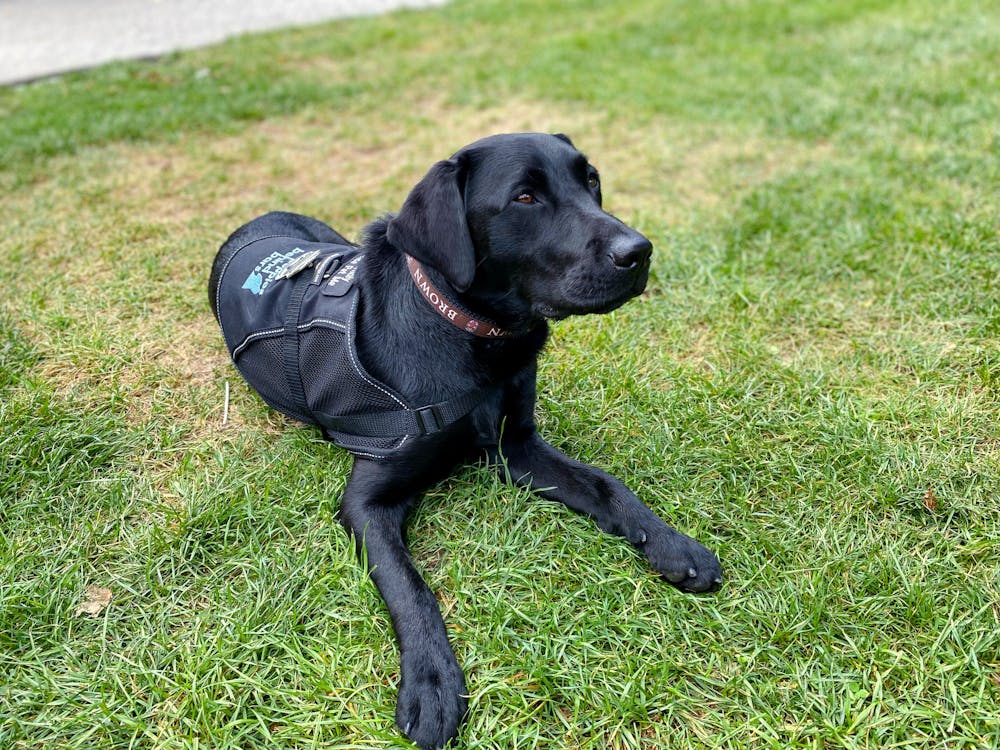Curious community members and passersby gathered at the steps of the Stephen Robert ’62 Campus Center Friday to attend the swearing-in ceremony of Brown’s newest employee: a one-and-a-half-year-old black labrador retriever named Elvy.
Elvy will serve as a facility dog on the Department of Public Safety’s community relations and outreach team, where DPS hopes she will provide comfort to Brown students and the surrounding community, according to Elvy’s business card, provided to The Herald by Campus Police Officer Dustin Coleman.
Coleman, a five-year veteran of the department, adopted Elvy through Puppies Behind Bars — an organization that teaches incarcerated individuals in New York and New Jersey to train dogs to work alongside police departments, veterans and first responders, according to the group’s website.
In his speech at the swearing-in ceremony, Lieutenant Kevin O’Connor said he thought DPS was lucky to gain a canine coworker: “Studies have shown that the presence of (a dog) can lower blood pressure and reduce anxiety,” he explained.
In addition to being a friendly face in the department and the Brown community, Elvy can also act as a therapy dog on DPS call responses for students in crisis, Sergeant Kelly Mitchell said. “If we go to a call where someone is feeling anxious, not feeling themselves (or) needs some extra attention and care, Elvy is on the way” to support students who would welcome a dog’s comfort, she said.
Brown Emergency Medical Services can also call upon Elvy in certain situations, but Coleman, who is Elvy’s handler, explained that he must remain in the room at all times to ensure Elvy is safe. Additionally, Coleman has contacted Counseling and Psychological Services to inform them of the therapy services Elvy can provide for students. “I want her to be an asset for them,” he said.
Coleman originally proposed bringing a K9 program to DPS after doing research and observing a similar program at Yale. Once he received approval from DPS and the University, he chose to apply to Puppies Behind Bars, in part because of its partnership with inmates in medium- and maximum-security prisons.
“You could tell (the inmates) put their heart’s work into (training Elvy for) what she does now, which is helping people,” he said.
Coleman said that his two-week training this summer for being a handler was a new experience — he had never entered a prison in plain clothes and had no idea what to expect. Though the officers adopting the dogs and the inmates training them were strangers at first, they built a meaningful relationship during the training, Coleman explained.
“It’s a communal feel, especially when (the inmates) hand you that leash … because they’ve been doing the work for the last year and a half” to train the dogs, Coleman said.
Elvy lives at home with Coleman and his family, which he said has brought him, his wife and his three children significant joy.
“It’s fun to see how happy she makes everyone here, but also how happy she makes everyone at my house,” he said. Though Coleman is Elvy’s handler, Puppies Behind Bars still legally owns her, and they will continue to visit regularly to evaluate Coleman and Elvy’s home and work environments. DPS covers the costs of Elvy’s veterinary visits and daily care, Coleman said.
According to Mitchell, having Elvy on campus has already brought some benefits. Elvy’s presence has changed the way that students and community members approach DPS officers, she explained.
Whereas some students may have previously hesitated to engage with DPS officers on campus, Elvy helps “break the ice” between students and officers and creates opportunities for conversation, Mitchell said. “Students approach to meet the dog, then look up and start talking” to us as well, she added.
Coleman agreed, sharing that he has interacted with more students in these past two weeks than he has in his five years combined in the department. He believes that many students are not totally aware of the scope of DPS’s work, and having Elvy with him creates opportunities to candidly discuss campus policing and hear student concerns and feelings about DPS.
Heather McClelland, a community policing officer for the town of Groton, Conn., said on a visit to College Hill that Chase — her facility dog from Puppies Behind Bars — similarly changed the nature of her work. McClelland takes Chase with her when she is doing community outreach, and Chase has become somewhat of a “mascot” in the Groton community, she said.
Standing on the Main Green with Chase, Elvy and Coleman, McClelland noted that the dogs trained in the program are meant to “connect people,” so it “makes sense” that the dogs themselves should be connected through occasional meetups.
In addition to her appearances on campus, Elvy has a growing social media presence on Instagram — both on her own account and on the DPS page. Mitchell hopes that Elvy’s social media presence will encourage student participation in DPS events, such as trainings on street harassment and bystander intervention.
“It’s just opening doors,” Mitchell said of Elvy’s social media presence.
Student groups on campus are also able to request Elvy to attend their events by reaching out over her Instagram or by emailing Coleman. But the number on her business card should only be called in emergency situations, Coleman emphasized.
Coleman said in his speech at Friday’s swearing-in that Elvy’s core mission is to build community. “She bonded people within the (correctional) facility with police officers they had never met before, … she bonded the inmates with the community outside who would come in to foster her … and more importantly, she is bonding Brown DPS with all of you in the Brown community.”

Sam Levine is a University News editor from Brooklyn, New York covering on-campus activism. He is a senior concentrating in International and Public Affairs.





